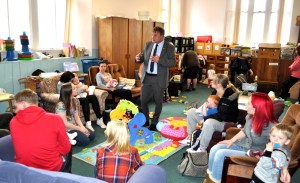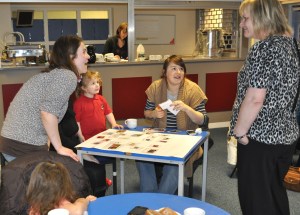Fife Council Pilot Report
What happened?
At the start of the pilot project an independent baseline study highlighted that although senior officers within Fife Council had a high level of awareness of equalities and their consideration as part of the decision making process there was less understanding of human rights amongst the workforce in general.
In addition the survey showed that the approach to impact assessments was, in common with many public authorities, one that was still seen as a “tick box” exercise rather than a process to help inform decisions and give proper consideration to how equality groups will be affected by changes to services and budgets. Fife Council wanted to develop a more robust response to equality and human rights impact at an appropriate place in the policy cycle.
In January 2013 council officers from across Fife received training on equality and human rights (see Building Block 3 - Staff, Training and Resources).
Following this training in February/March 2013 initial meetings were held to identify which area would be of significance to undertake an assessment. It proved to be a challenging task to identify the most appropriate area not least because it was felt that it was very important to undertake the assessment at the appropriate time in the policy cycle and that many areas were already at the point of final decision making.
The Impact Assessment process
In May 2013 it was decided to focus on the impact of Welfare Reform legislation on the lives of those who were lone parents within Fife.
An Action Plan was developed with four main stages.
The first stage was to conduct desktop research to gather evidence on the overall population of Fife and specifically to examine the relative impact of welfare reform changes upon those who were lone parents. In addition evidence from other authorities and sources was gathered by the Fife Equalities Unit and their colleagues in the Welfare Reform team. This process helped to identify the particular gaps in knowledge and evidence in relation to lone parents. This was undertaken in July and August 2013 (see Building Block 6 - evidence gathering).
The second stage was specific and bespoke training on human rights and equality issues which was delivered to staff from Fife Gingerbread delivered in August 2013. These staff had been selected to assist in the conduct of one to one interviews with a range of lone parents in Fife who had been or might be affected by Welfare Reform changes (see Building Block 3 - Staff, Training and Resources).
Fourthly, in early January 2014 an impact assessment day was held with a large number of stakeholders including senior management and policy officers. The primary purpose of the day was to consider the evidence which had been gathered in relation to the impact on lone parents of welfare reform in Fife using an equality and human rights framework. The presence of frontline workers who were directly working with those affected by the impact of Welfare Reform helped participants to identify contributory and combined impacts as well as supporting council officers present to begin the process of identifying potential changes.
In terms of equality, age (both younger and older people), disability and to a lesser extent race was a factor in how people were affected by welfare reform. It was also noted that in some instances welfare reform was not the only contributing factor affecting people and that a holistic overview needed to be taken to the cumulative effect of a number of issues affecting people’s quality of life and circumstances.
Following the workshop session, a number of actions have been progressed including the development of a final EQHRIA and highlighting the issues raised with the Chief Officer Welfare Reform Group. Fife Council Area Service Managers have been asked to consider at a local response to welfare reform in light of the evidence presented (see Building Block 9 - Conclusions and Recommendations).
The Senior Equalities Group of the Council held a development session in January 2014 where they took feedback on the pilot and have started to develop thinking on its impact for staff training and learning development and on re-modelling existing guidance for impact assessments.
The lessons learnt included:
-
A strong conviction that frontline staff and those working directly with people affected by changes to services need to be involved in the impact assessment process as this enriches both the outcome and highlights the connections between impacts.
-
The project highlighted the importance of not only gathering data and evidence of a quantitative nature but the central role which qualitative research through focus groups and community engagement can offer any impact assessment process (see Building Block 7- Involvement of Communities).
-
One of the insights from the project was the degree to which officers felt that the role of moderation was important in ensuring a proportionate response.
-
The added benefit of using a human rights lens to examine issues which are not covered by the equality duty (see section on Added Value of Human Rights).
-
The experience of identifying what to impact assess as the focus of this pilot highlighted for participants the importance of timing and the need to assess impact early within the policy cycle and to developing some strategic prioritisation for what to impact assess (see Building Block 2 - Timin and Capacity to influence decisions).
-
Fife Council also highlighted that the project illustrated the necessity of approaching impact assessments in a very different way - changing the culture and language around EQHRIAs and promoting them as a way of making better decisions and improving outcomes and service delivery for people as opposed to having to meet legislative obligations (see the section on the benefits of EQHRIA).
-
The bespoke training which was delivered served to highlight the importance of human rights and equality in service delivery as well as impact assessment and enabled a more robust consideration of the issues when the impact assessment was being carried out (see Building Block 3 - Staff, Training and Resources).






